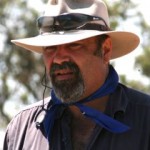Review must look at cultural inclusion: Frankland
Stone Bros. director Richard J. Frankland says the government review is an opportunity to instigate cultural inclusion in the Australian screen industry, but fears that other issues will take priority.
“We [Indigenous creatives] haven’t been a major priority in the past, but we would be small-minded to think that the industry is just about making money; it’s really about cultural growth,” Frankland told Encore.
The director added that Australia should have a quota for Indigenous producers, writers, directors and actors.


